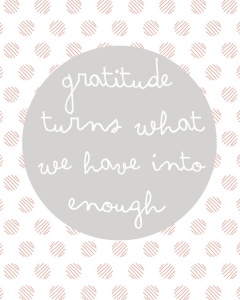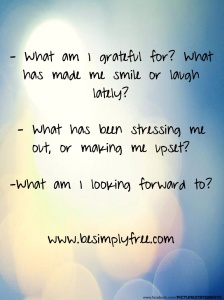
image found here
Taking a glance at any best-seller list will tell you this – people want to be happy, or happier. At any point in time, there are at least a handful of books on the lists that will tell you how to find greater happiness. Whether its through the practice of mindfulness, the law of attraction, spirtuality, “leaning in” or otherwise, the common thread in all of them is gratitude. Being thankful for what you have is the cornerstone to achieving life-long contentment and is fundamental to living a meaningful life, with less.
Research in the positive psychology field points to the myriad of benefits of cultivating gratitude, which can be summed up in a few short words –
Gratitude makes good things great, and bad things better.
Here’s just a few ways:
Better relationships
Expressing your gratefulness for the things in your life, whether outwardly, or inwardly has been proven to strengthen social connections and improve relationships. I have definitely found this to be true in my own life. My boyfriend and I regularly make a point to ask each other what we are grateful for, at least a few times a week. It has brought us closer together, and has also strengthened our appreciation for each other, and made it easier for me to recognizing when he is showing his love for me. For example, my primary way of showing people I love them is through words, whereas Jordan is more likely to do practical things. I have come to realize that when he puts out my vitamins, or packs my lunch, that is his way of saying “I love you. I care about you.” And to me, that’s better than a dozen roses, or jewellery anyday.
Maximize your satisfaction and enjoyment
Think back to one of your favourite memories – the birth of your child, a vacation, time spent with a loved one, completing a marathon. Doesn’t it just give you that fluttery feeling in your heart? That’s joy, twice over, three times over, unlimited times over. You don’t always need to go on another trip or buy something new to get that feeling. Conjuring up previous happy times, is like tapping in an endless well of satisfaction; there is no limit to how much you can extract. Even in the present moment, thinking “How lucky am I?” or, “Isn’t this great!?” will help you savour it more.
Decreased need
Regularly practicing gratitude helps you hop off that hedonic treadmill. Hedonic treadmill, or hedonic adaptation, is really just a fancy way of saying while certain events may improve or decrease our happiness over the short-term, we as humans are able to adapt to our circumstances, and will generally return to a relative ‘set-point’ over time. You have likely heard that winning the lottery, or becoming a parapalegic does generally not make you any more or less happy over the long-term, despite what many believe. I would argue that if you use your lottery winnings for experience rather than things, your happiness could very well improve, provided you have an attitude of gratitude. By developing an appreciation for what you already have, you are less likely to feel the need to acquire more. Recognizing and being thankful for the opportunities, relationships and possessions you have will continue to provide satisfaction over the long term. When you’re happy with x,y and z, will x,y and z 2.0 really improve your life? Probably not. You might not have everything you want in life, but chances are you already have everything you need.
Improved self-worth and self-esteem
I used to care a lot about what other people thought of me, and live in fear of being judged. As I’ve cultivated gratitude in my life, the opinion of others, with the exception of the few who are close to me have begun to matter less and less. I feel I can be my authentic self, unapologetically. I now rely less on the validation of others to improve my self-esteem, and fall for the traps that those sneaky advertisements set, preying on people with low self-worth and self-esteem. When you become more cognizant of all your abilities and accomplishments, no matter how small, your confidence improves. We can’t be awesome all the time, and will inevitably encounter disappoinment and failure at some point, but practicing gratitude can act as a buffer against the negative emotions that might surface.
Shield against negative life events
Research also demonstrates that gratitude decreases negative emotions, such as anger, greed and jealousy. Searching for that silver lining when confronted with trauma, loss, stress or illness can boost your resiliency, making it easier to adapt, learn from, and move beyond your experiences. This can really be a tough one, I get it. How can someone possibly be grateful for receiving a cancer diagnosis, losing their job, after a break up, or divorce? In the days and months after my sister’s death at only 23 years old, I was angry and upset about the injustice of it all. I struggled for a long time afterwards with grief, depression and disbelief. Although I miss her everyday, I have been able to transform my grief into gratitude. I am grateful for the relationship we had, for learning not to take things, people and life for granted, for realizing how truly precious and short life is, and that you should follow your heart, live life to the fullest, without regret. From this gratitude also comes resiliency. I, and you, are all able to survive, and thrive, through difficult times, should we choose to.
Practicing Gratitude
The beauty of counting your blessings is that it’s accessible, it’s free. It can be done anytime, anywhere, by anyone. One of my preferred methods is keeping a gratitude journal. If you take a peek in my journal, you will see the pages and pages of the following 3 questions –
Often times, the things I’m grateful for are seemingly trivial – a funny video, not missing the bus, finally finding a recipe for gluten-free bread that doesn’t taste like saw dust or fall apart when you eat it. Other times, its the bigger things – having a job I love, close relationships with family and friends, good health. When reflecting on my day, I intentionally sandwich the negative in between the positive. Once you’ve made a list of all the great things going on in your life, the stressors in your life tend to seem a little less important in the grand scheme of things.
Making the expression of gratitude a regular practice is what helped me finally crawl out of that dark pit of despair for good (I hope). At first, it was difficult to come up with more than one or two things, but over time it became easier. Just like anything, the more you do it, the more likely it is to become second nature. That is, in essence, the law of attraction in action – what consumes your thoughts ends up becoming your reality. When I neglect to reflect on the positives in my life, it becomes very apparent to myself, and to those close to me. I become more moody, less motivated and begin to look outside myself for contentment. When this happens, you will usually find me laying in bed more than usual, eating comfort foods and judging random people on Facebook. Sometimes I get really crazy and do all three at once. Hey, no one’s perfect…but having self-awareness is a good start to making positive changes, right?
Further reading
If you’re looking for a resource to improve your life, I highly recommend Sonja Lyumbomirsky’s The How of Happiness:A Scientific Approach to Getting the Life You Want . After struggling for nearly of three quarters a decade with cyclical depression, this book was truly a game-changer for me. It’s full of practical advice and activities to help you develop habits to lead a happier, more joyful life. It’s a book I keep referring back to over and over again.
Share what you’re grateful for in the comments!
Disclaimer: This post contains affiliate links, for which I earn a small commission for sales made, however the price remains the same for you. I only provide links for products and services which I truly believe in, and fit with the message of Be Simply Free.
These opinions are based on my own personal experience. I am neither a psychologist or psychiatrist. Although adopting an attitude of gratitude may improve your happiness levels and outlook on life, please consult your health care professional before discontinuing any medications.


